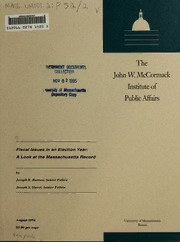Table Of ContentV
The
IVERNMOIT OOCOMEHTS
^
COLLECTION
McCormack
j^j^
NOV 0 2 1995
^^^tute of
r,i««.ty of M^sachuett.
'^'^'^
PublicAffairs
Fiscal Issues in an Election Year:
A Look at the Massachusetts Record
by
JosephR. Barresi, SeniorFellow
Joseph S. Slavet, SeniorFellow
August1994
UniversityofMassachusetts
Boston
$5.00 percopy
TheMcCormackInstitute
TheJohn W. McCormackInstitute ofPublicAffairs, establishedin
1983atthe UniversityofMassachusettsBoston, andnamedin honorofthe
lateJohn W. McCormack,formerSpeakerofthe U.S. HouseofRepresenta-
tives, isamulti-purposepublicpolicyresearch institute.
Operatingoutoffourseparate Centers, itsfellowsandstaffrepresent
someofthemostaccomplishedacademicsandpractitionersfromsuch diverse
fieldsasjournalism, economics,politicsandthesocialsciences, connectingthe
Universitycommunity to thecentersofpowerandinnovation in theprivate
andpublicsectors.
Itsfaculty,fellowsandstaffare involvedin teaching, surveyresearch,
educationalandinformationalseminars, thepublication ofbooks, academic
papersandnewspapercolumnsaswellasappearingregularlyasguestspeakers,
moderators, andpanelistson TVandradio.
Theviewscontainedin thispaperare thoseoftheauthor(s) andnotthe
John IV. McCormackInstituteofPublicAffairs.
Fiscal Issues In an Election Year:
A Look at the Massachusetts Record
by
Joseph R. Barresi, SeniorFellow
Joseph S. Slavet, SeniorFellow
August 1994
The Authors
Joseph S. Slavet is a Senior Fellow at the McCormack Institute, former Director of
Boston Urban Observatory, the first Director of Action for Boston Community Development,
and a former Executive Director of the Boston Municipal Research Bureau. Slavet has had
diversified administrative, research, and consultant experience and has co-sponsored many
books on state fiscal policy, state land use policy, municipal finance, and educational policy.
Joseph R. Barresi is a Senior Fellow at the McCormack Institute. He was the first
Inspector General of the Commonwealth of Massachusetts, serving between 1981 and 1991.
Barresi is a former Vice President of the investment counselling firm of Scudder Stevens and
Clark and a former Executive Director of the Boston Municipal Research Bureau. He has
had considerable experience in financial analysis and financial investigations and has authored
many research reports on municipal government policy and financial administration.
TABLE OF CONTENTS
Executive Summary
Introduction
I. Fiscal Performance, FY1992-94
The Good News: Short-Term Fiscal Stability 2
Structural Fiscal Balance: Still An Elusive Goal 4
GAAP
Culprits 8
Funds Analysis: Proliferation and Distortion 11
Budgetary Discipline 16
FY95 Budget: A Delicate Balance of Election Year Initiatives and Fiscal Reality ... 21
II. Fiscal Policy Issues
Control of Budget Busters: An Update 23
Medicaid 23
Public Assistance 25
Debt Service 30
Pensions 30
Group Health 31
MBTA and RTAs 32
Incipient Budget Busters 33
III. Budgetary Initiatives: Short- and Long-Term Implications
State-Local Fiscal Relations 36
Educational Reform 43
Prevention Programs 44
Tuition Retention for Higher Education 45
IV. Revenue Forecasting
Tax Revenues: A Progress Report 47
Non-Tax Revenues: Search For A Reliable Forecasting Methodology 48
V. Tax Policy Issues
Impact of State Tax Policies/Actions on Tax Reform and Tax Equity 49
Tax Equity vs. Tax Competitiveness: Difficult Policy Choices 51
VI. Major Conclusions 56
VII. Recommendations 63
Digitized by the Internet Archive
2015
in
https://archive.org/details/fiscalissuesinelOObarr
EXECUTIVE SUMMARY
Massachusetts is finally achieving short-term fiscal stability, but it has not yet reached
its goal of structural fiscal balance as measured by Generally Accepted Accounting Principles
(GAAP).
Continuing difficulties in achieving structural fiscal balance are demonstrated by the
following results, among others:
GAAP
a) End-of-year fund balances on a basis are still negative although the deficit
margin has"been shrinking.
b) When the books are finally closed, FY94 may at best show a marginal operating
gain.
c) The state's principal budgetary fund, its General Fund, has been and is still in
chronic deficit.
d) Operating budget margins have been perilously slim over the past three years
because all of the improvement in tax collections have been used for additional spending.
e) Massachusetts has accumulated a steadily-growing, built-in budget crunch due to
heavy, long-term fiscal commitments such as education reform which will consume about 75
percent of total tax revenue growth and dominate budgetary decision-making during every
fiscal year until the year 2000.
The following are other major conclusions of the report:
a) The state's efforts to strengthen its financial planning and management capacity and
to provide the public with a comprehensive, accurate and clear-cut picture of state finances
are being stymied by unstemmed proliferation in the number of budgeted and non-budgeted
funds, by the growing trend toward approving dedicated revenue streams for politically
popular programs, by appropriation splitting among funds, and by end-of-year interfund
transfers.
b) Sizeable annual surpluses in the Highway Fund, the Local Aid Fund and such
politically-sensitive funds as the Health Protection (anti-smoking) Fund have become political
"smoking guns."
c) The FY95 budget approved by the Legislature and Governor reflects a delicate
balance of fiscal reality, driven by prudent assumptions on revenue growth and election-year
initiatives, with the hot-button issue of welfare reform only temporarily resolved by the
budget and to be further debated during the election campaign, and the graduated income tax
amendment of the state Constitution and the collateral graduated tax bracket statute left to
popular referendum for ultimate decision.
d) Concerted and continuing efforts to control the costs of the state's budget busters
have paid off and, on balance, this cost-reduction campaign has proved successful. However,
there is growing concern that corrections, water/sewer rate relief and welfare reform could
easily shift from incipient to full-fledged budget buster status in view of their actual and/or
potential escalating costs.
e) Since the low point of $2,330.7 million in FY92, the Commonwealth has increased
its total distribution of direct local aid by $600 million, an improvement of 27 percent during
the 3-year period, but in FY95 still $40 million below the FY89 total.
f) Local aid policy shifted dramatically effective in FY94 with enactment of the
educational reform act from a general revenue sharing model to a targeted local aid model
that requires two-thirds of direct local aid to be earmarked for educational purposes.
ii

